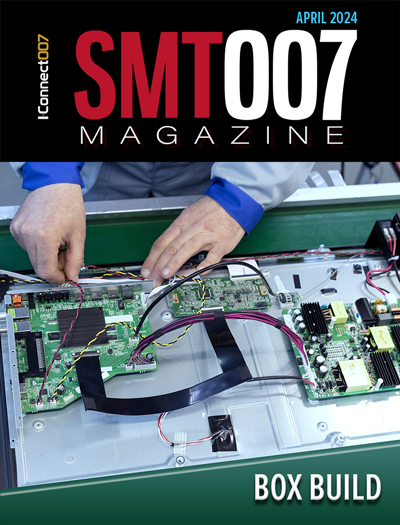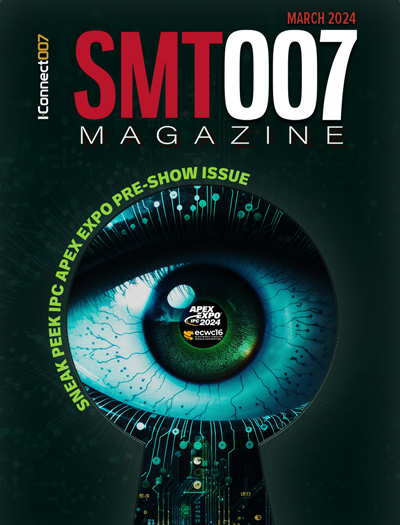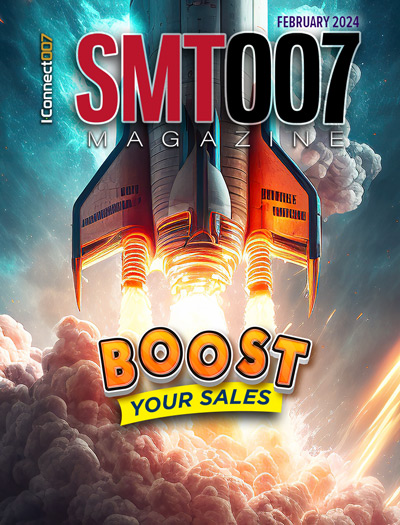-

- News
- Books
Featured Books
- smt007 Magazine
Latest Issues
Current Issue
Box Build
One trend is to add box build and final assembly to your product offering. In this issue, we explore the opportunities and risks of adding system assembly to your service portfolio.

IPC APEX EXPO 2024 Pre-show
This month’s issue devotes its pages to a comprehensive preview of the IPC APEX EXPO 2024 event. Whether your role is technical or business, if you're new-to-the-industry or seasoned veteran, you'll find value throughout this program.

Boost Your Sales
Every part of your business can be evaluated as a process, including your sales funnel. Optimizing your selling process requires a coordinated effort between marketing and sales. In this issue, industry experts in marketing and sales offer their best advice on how to boost your sales efforts.
- Articles
- Columns
Search Console
- Links
- Events
||| MENU - smt007 Magazine
Factronix on Cleaning, the Market and More
August 6, 2018 | Barry Matties, I-Connect007Estimated reading time: 7 minutes
Factronix is a distributor of cleaning machines covering the European market and, more specifically, the automotive market in Central Europe. In an interview with I-Connect007, Stefan Theil, product manager at Factronix, discusses the growing need for cleaning in European electronics manufacturing and the demands he's facing from customers when it comes to finer pitches, automation, and environmental concerns.
Barry Matties: Stefan, as the product manager at Factronix, in Germany, please tell me a little bit about what your company does.
Stefan Theil: Factronix is a European distributor for more than cleaning machines, but that's one of our main targets. We're covering the European sales for company PBT Works, in the Czech Republic. PBT Works is a machine builder for cleaning systems that covers all the cleaning, electronic wise, which means stencils, stencil cleaning, then PCB cleaning, maintenance cleaning, and palette cleaning. So we try to cover the complete range and we do that with pretty good success.
Matties: Talk a little bit about the market right now in Europe. It seems like things are going well. How are sales and the general attitude here?
Theil: The market is pretty good, a lot of growth right now. We still have a good economy especially in Germany, but Austria and Switzerland are doing pretty well. People are investing in the new equipment and that's what helps us a lot.
Matties: Right, and of course here, automotive is a big factor in the industry.
Theil: Automotive is a big factor, especially for Germany. We are the car builders right now. Just think about BMW, Mercedes, Volkswagen, and they all start now with cleaning, and that what helps us a lot.
Matties: That's a new trend isn't it?
Theil: It is, and they must clean right now. You see, cleaning is all about the electronic boards, and the cars have more and more electronic boards and all these boards must be cleaned. Everything that is good for security in the cars must be cleaned and that helps us a lot. Everything is getting smaller, more complex, and the trend is definitely for cleaning.
Matties: So when you talk about cleaning, are you talking about like a flux removal cleaning? What sort of cleaning applications specifically are they looking at?
Theil: They're looking specifically for flux removing, de-fluxing, they're looking for substrate removing, and they're looking for cleaning before they do bonding. So that's a completely new challenge for the machine builders because the machines must be more complex, must follow the new rules, and that's for us a pretty new target.
Matties: When they're looking at their cleaning processes, what sort of questions or demands do they have that they come to you with?
Theil: The first would be shortest time. The second thing is of course being cost effective. Cleaning costs money, that's a fact, and so we try to help the customer in the complete way. That means process development on one hand, and on the other hand good cleaning equipment. It must fit together. It must be a mix between a good cleaning agent with the lowest concentration, and it must be a very good cleaning system with a high standard and a good measurement of the bath. For example, Kyzen Analyst, which helps us a lot and is really pushing the market.
Matties: That's their new analysis tool that measures bath in real time and gives feedback?
Theil: It is, yeah. It gives you instant feedback as measuring the bath concentration, it is measuring the temperature of the bath, and it is like a brain for the machine, right? It also is telling the machine, "Give me more concentrate. Give me more water." There is no human manpower doing anything. Makes everything fully automatic; it is an open source system which helps the customer a lot if you change chemistries in a short time. And the mega-bonus for the complete thing is that it saves the data in the cloud, so I'm sitting very relaxed on the show and I can watch my bath at home.
Matties: And I think with data analysis you probably extend the life of your chemistry as well, is that the case?
Theil: Yes.
Matties: So it lowers your total operating cost.
Theil: At the end it's all about the cost, and it helps you save the bath time. Bath time is way longer than before. There’s no guessing, no assuming, should I put concentrate in or not? It is really on focus.
Matties: When someone comes in and asks you advice about cleaning, what piece of advice would you give?
Theil: First thing is to look at the PCB board. How big is it? What kind of component do we have on the board? Do we fine pitch components? Do we have BGAs on the board or not? QFNs or not? And then if you covered that part, then we can think about machine-wise what we can do. Of course, capacity—how much do you have to clean? But if you have a small amount or big amount, we can cover everything. Maybe the biggest advice right now is to do it fully automatically. Don't do it manually. Everything that you do manually will not help you. It might destroy the board if you do it the wrong way.
Matties: Why is that?
Theil: Because we are humans. If we are having a good day, then you will do very precise cleaning and it could be fine and good. If you have a bad day and you have maybe five beers before, then it can be worse. Second thing is if you have, for example, a BGA on the board or small QFN on the board, you will never have a chance to come under the QFN, under the BGA, fully covered if you do it manually. You have spray cans that are covering the market right now, but with these spray cans you don't have the same effect as when you clean fully automatically. That's for sure.
Matties: What do you think the greatest challenge is in cleaning?
Theil: The greatest challenge in cleaning for the future is for sure fine pitch. Everything becomes more complex, smaller. The boards are pretty challenging for us, to be honest, and that’s what we're fighting right now. I think we have good coverage from the bath monitoring, everybody brings out new systems, everybody is doing their lot, but now we need to be more focused again on chemistry to cover the fine pitches.
Matties: Is there an environmental impact from the cleaning process that people need to be aware of?
Theil: There is. Well, in Europe the trend is of course water based. We have right now 95% of the machines are water-based solutions. The rest is nearly gone. It’s on one hand because of the environmental laws, what we have in Germany right now. We have green country, which is really good, but it’s also targeting us not only from the chemical side, but it’s targeting us more from the machine side. So what we are going to offer the customer is a completely closed loop system, which means you have no waste water which goes in the environment, which is a pretty good thing. The customer is safe and won’t have any regulations from the government right now. The customer just plugs in the machine, installs the machine and, there you go, run it.
Matties: What happens if the material becomes spent?
Theil: We take the materials back or the chemistry back.
Matties: So you're picking the chemistries up and hauling them away.
Theil: We're taking them back and then we try to recycle them.
Matties: But the advantage is that your customer doesn't have to deal with it; you're dealing with it.
Theil: Right. The customer doesn't have to deal with that and has no waste water.
Matties: Is that service that they have to pay you for?
Theil: That's free. It's all about making it easy for the customer. No waste water means no speaking with the government, means no regulation from the government, no checking from the government. It is a closed loop system, you just need power and that's it.
Matties: Is there a trend to see more and more closed loop throughout the entire manufacturing process here?
Theil: For sure in the middle of Europe, yes. That's not for East Europe, different regulations and different laws, but we need to be covered for the future for all of Europe. I'm assuming the European government will make this a standard and bring it to all of Europe.
Matties: Yeah, and then the rest of the world follows.
Theil: We will see.
Matties: Hopefully. Well Stefan, is there anything that we haven't talked about that you'd like to share?
Theil: I don’t think so.
Matties: Okay, thank you so much for sitting down and taking the time out.
Theil: Appreciate it, thank you.
Suggested Items
Europlacer Announces Introductory Promotions for 2024 IPC APEX EXPO
03/27/2024 | EuroplacerEuroplacer, a leading provider of SMT assembly solutions, is excited to announce special introductory promotions for its latest products at the upcoming 2024 IPC APEX EXPO, scheduled to take place April 9-11, 2024 at the Anaheim Convention Center in California.
GEN3 to Demo SIR Testing, Stencil Cleaning & More with Horizon Sales at IPC APEX 2024
03/07/2024 | Gen3Gen3, global leader in SIR, CAF, Solderability, Ionic Contamination & process optimisation equipment, to announce its participation in the 2024 IPC APEX EXPO, scheduled to take place April 9-11, 2024 at the Anaheim Convention Center in California. At booth 3934, GEN3 will be exhibiting alongside Horizon Sales, presenting a lineup of advanced technologies aimed at enhancing the efficiency and reliability of circuit assembly processes.
AAT's Patented Rotational Spraying Method Ensures Superior Cleaning Performance
03/07/2024 | Austin American Technology (AAT)Austin American Technology (AAT) is pleased to announce that its patented rotational spraying method ensures superior cleaning performance, delivering consistent results for critical electronic components.
StenTech’s Photo Stencil Specialized Products Division Facility Update Completed
02/27/2024 | StenTechStenTech® Inc., a leading global company specializing in SMT Printing Solutions, has completed a major technology update to their Photo Stencil Specialized Products Division in Golden, Colorado. The phase-one overhaul included upgrades to key areas, including imaging, chemical plating, and chemical coating, along with refreshed offices and board room.
Stencil and PCB Cleaning Solutions from KYZEN at SMTA Monterrey
02/27/2024 | KyzenKYZEN, the global leader in innovative environmentally friendly cleaning chemistries, will exhibit at the SMTA Monterrey Expo & Tech Forum, scheduled to take place Thursday, March 14, 2024 at the Cintermex Convention Center, Hall 2A in Monterrey, Nuevo León. KYZEN will showcase the new aqueous chemistry AQUANOX A4618 in addition to highlighting stencil cleaning chemistries KYZEN E5631J and CYBERSOLV C8882.


